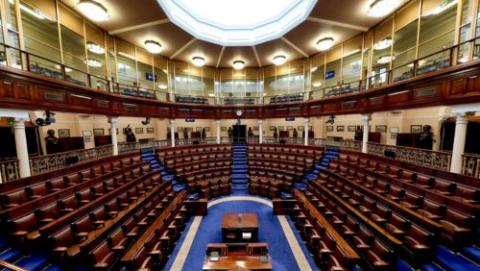
With the recent Budget providing a breakthrough in our longstanding advocacy campaign to improve access to the Free Travel scheme for people with epilepsy, the matter was discussed in the Dáil last week– which has provided further information on the amended scheme, as well as the reasons behind why the changes will not be implemented until July 2024.
The changes to the Free Travel scheme were discussed in the Dáil last week by Minister Heather Humphreys and Deputy Pauline Tully, as part of a wider question on Free Travel eligibility. We have provided the most relevant parts of interest to people with epilepsy in the video below:
In addition to the above, the matter was also raised Parliamentary Question by Deputy Colm Burke. You can see the question and the Minister’s written response below:
Deputy Colm Burke asked the Minister for Social Protection the changes she is making to her Department’s free travel scheme to support people with epilepsy and other medical conditions who cannot drive but are not in receipt of a social welfare payment; and if she will make a statement on the matter. [46185/23]
Minister Heather Humphreys
The Free Travel scheme provides free travel on the main public and private transport services for those eligible under the scheme. There are over one million customers with direct eligibility. The estimated expenditure on free travel in 2023 is €95 million.As part of Budget 2024 I was particularly pleased to extend my Department’s Free Travel Pass to support people who are medically certified as unable to drive including those with Epilepsy.
The measure will expand access to the Free Travel scheme to:
- People who have never been able to drive due to a disability.
- Drivers who have a license and have been deemed medically unfit to drive for a period of one year or longer. In some cases these drivers will only need the Travel Pass until they are medically certified to drive again.
In addition, there will be no requirement that the person be in receipt of a Social Welfare payment to qualify for the medical free travel pass; however they must meet the other qualifying criteria.
The measure could also benefit people who return to work, from certain long-term disability schemes, and lose their free travel entitlement after 5 years. If they are deemed medically unfit to drive for a period of one year or longer, they too may qualify for the medical grounds free travel pass.
This measure is a significant expansion of the free travel scheme and will require my Department to develop a new administrative process, engage with outside agencies and transport providers and update the Department’s I.T. systems.
It is for this reason that the implementation date for the measure is July 2024. I hope this clarifies the matter for the Deputy.
The responses confirm that the Department are essentially going to implement what Epilepsy Ireland have been proposing for a number of years. We have no doubt that when this comes into force, it will make a positive impact in the lives of many people living with epilepsy. Once again, we would like to outline our thanks to the Minister for securing this change in Budget 24, and to all elected representatives who supported the campaign over the years.
With regard to the measures not being implemented until July 2024, we know that this will be disappointing for many people who are currently off the road or unable to drive due to their epilepsy. While we will of course be advocating for this date to be brought forward, we do understand the Minister’s and Department’s position here in allowing sufficient time to put the necessary resources in place in order to make this change. As the Minister has noted, the scheme has not been altered for many years, and this is a significant change to how the scheme previously operated so it will take time to make the changes required.
We will be keeping in close contact with both the Minister and her Department regarding this and when further information on the new process becomes available, we will share this to our website and social media channels.
If you would like to learn more about the history of this campaign, visit the ‘Advocacy’ section of our website.
